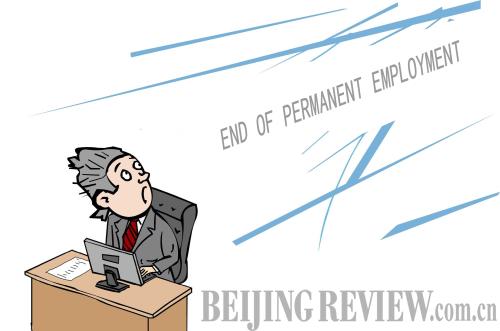|
 |
|
(LI SHIGONG) |
Recently, two news articles on the practice of employing civil servants attracted widespread attention. One article covered a story of five newly employed civil servants in Yiwu of east China's Zhejiang Province, who are to receive an annual salary of no less than 300,000 yuan ($48,000), much higher than the salary level for the vast majority of China's civil servants. The other piece discussed the fact that several years after the local government in Shenzhen, south China's Guangdong Province, began to adopt the contractual employment system for civil servants, none of the more than 3,200 employed have been dismissed.
Contractual hiring of civil servants is still a new effort in reforming the recruitment of civil servants, and its effect remains to be seen. Will it improve China's existing civil service management system? The following are excerpts of opinions:
Song Shiming (China Youth Daily): According to China's Civil Service Law, government departments can hire civil servants on a contractual basis for highly professional or assistant positions as long as it is in line with requirements for the specific work.
Under this new contract system, government departments no longer need to train personnel with special professional techniques within the existent civil service teams, but they can directly choose already skilled individuals from the workforce. Indeed, under the current civil service examination is almost impossible to recruit such talented people. Even if people with these skills have joined the civil service, at the current salary level it is impossible to attract exceptional individuals in any sector. Another reason for the adoption of contracts is that, it's unnecessary to offer a lifetime position to one who does simple work, such as a typist.
The signing of the written employment contract poses as a gesture to break the permanent employment for civil servants. For years, as long as one had passed the civil service examination and was employed, it's almost impossible for them to lose their jobs if they don't make serious mistakes. For contractually employed civil servants however, rights and obligations for both sides are explicitly written on contracts. For instance, an employed civil servant must fulfill certain tasks before he or she can receive salaries. When the contract expires, the position for a temporary civil servant no longer exists, but if the position is to be kept for some more time, then the contract has to be renewed. This marks a big change.
In countries where an employed civil servant mechanism is quite mature, there are detailed explanations and regulations for the dismissal of such people.
Liu Xiangling (www.rednet.cn): The contract system for civil servants offers higher salary even triggers envy among the public, and questions arise.
Why in Shenzhen, after the three-year contracts expired, was no one dismissed? Isn't this contract system the same as the old job-for-life employment system? However, from a more objective perspective, the fact that one is not dismissed after three years' serving in a government post does not mean that he or she will not be dismissed after five or 10 years' employment. Another possibility is that, these temporary civil servants value their jobs and work even harder than common civil servants, and as a result managed to stay employed.
Nobody should envy contractual workers who receive high salaries, but it should be regarded as an effective way to attract people of special qualifications.
A doctoral degree, special techniques and also rich experience, these qualities are possessed by the same person. Not many people can be so excellent as this. As far as this person is concerned, even if he or she does not enter the civil service, high salaries are also within easy reach. His or her choice of the job may be because of their true love for this profession. We have to wait and see to what extent these civil servants can help government work and it's still too early to deny them and deny this new employment system.
| 